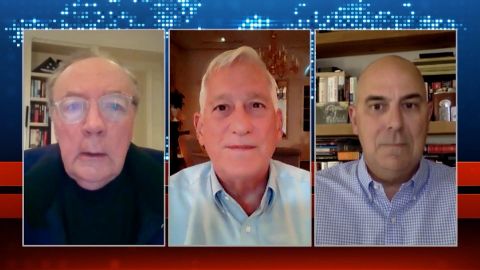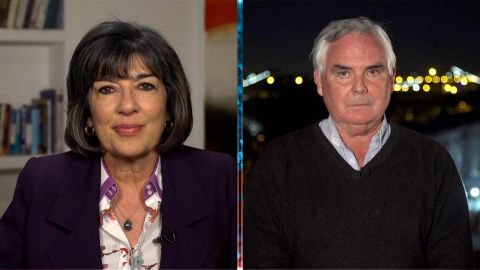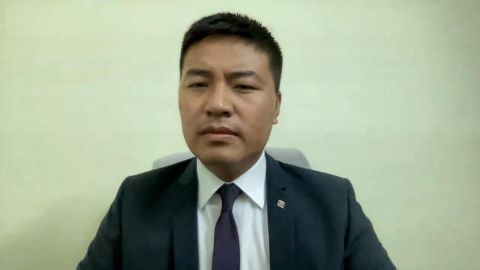Read Transcript EXPAND
CHRISTIANE AMANPOUR: Now, many Americans will, at some point, have thanked a member of the military for their service. But my next guests say that most are not aware of the day-to-day realities for those who do serve their country. “Walk in My Combat Boots,” true stories from America’s bravest warriors is a new book by bestselling author, James Patterson, and also retired U.S. army sergeant, Matt Eversmann. It tells stories of 85 veterans from Vietnam to Iraq and Afghanistan. And here they are, the authors, telling our Walter Isaacson why we need to understand the military better than we do.
WALTER ISAACSON: Thank you, Christiane. And James Patterson and Matt Eversmann, thank you so much for joining the show and congratulations on a book about people who truly, truly are worthy of teaching us lessons.
JAMES PATTERSON, CO-AUTHOR, “WALK IN MY COMBAT BOOTS”: Yes. You know, when Matt and I — when we decided to do the book, we had two things in mind. One, if you had served, if you’ve been in the military, you would say that Sergeant Eversmann and Patterson got it right and they gave us a voice, which we haven’t necessarily had in the past. And if you don’t really understand the military, and a lot of people think they do, but they don’t, you will understand what it means to serve and you will understand what it means to put your life on the line for somebody else. And the next time that you thank somebody for their service, you will know what you are thanking them for.
ISAACSON: Yes. Well, Matt, you were truly a hero. You were in Mogadishu. You were part of Black Hawk Down. You’ve served in Somalia and many other places. And yet, the book is about some of the ordinary people, the ones who don’t go rushing into crashes, you know, and fighting, but they are just there doing their duty in ways that are awesomely inspiring.
MATT EVERSMANN, CO-AUTHOR, “WALK IN MY COMBAT BOOTS”: Yes. Well, thank you for picking that out because that was by design. And, you know, the — our military is made up. Like Jim said, these are just great men and women down the block. You know, they cover, you know, the A-to-Z wide path. And, you know, whether you are a truck driver driving down around Irish (ph) in Iraq every day for a year, dodging IEDs or a logistician Kandahar, you know, you are carrying as much water as any, you know, Delta Force guy, and that’s not a knock on anyone, it’s not this scale of courage. Just — it’s a great big team of teams. And we were glad to tell their stories.
PATTERSON: And they are so humble. I mean, they are so humble. They would — you do the interviews, you’d write it up or whatever, and they would be thanking you. Thanking you. You know, one of the things about this, and one of the reasons that I was interested and Matt as well is that, you know, like when my father came back from World War II, he never talked about it. He would never tell us anything about what happened. And I think a of it — that’s our experience with our fathers and mothers, brothers and sisters, whatever, friends from — you know, of my era, the guys who went to Vietnam, they won’t talk about it, mostly. They will talk about other events. And the thing I saw — Matt do some interviews, and, you know, a lot of times when you do interviews, and you’ve this, Walter, there’s a — you don’t totally trust the person you are talking to 100 percent. I don’t trust you at all here. No. But they trusted Matt and they would tell the stories, and Matt knew the right questions and he knew the right follow-up questions, and that’s why — you know, interview report we had 50 pages and we go so much truth, they talked about everything. And then, the next thing was to turn those into five, six, seven-page stories so that it would all be readable.
ISAACSON: You know, you are bestselling author of our time. I mean, more than 240 New York Times bestselling —
PATTERSON: I know. That’s sad and tragic. But it is true. Yes.
ISAACSON: I mean, that’s like, you know, more years than we have. So, that’s amazing, the number of best sellers. But you turned your attention to this. Why?
PATTERSON: It is rare for me that I’ll read a book or watch a film or a series or whatever, where I really learn something, it changes me in a significant way. I think that understanding the military is really important for people. I think understanding police is really important, really understanding, and then we can make decisions. We are sending the book to everybody in Congress because, I think, it’s useful for them to read it. Matt is — we reached out to West Point in Annapolis, and they’re going to give it to everybody in West Point because they think it’s useful for these men and women to read about this before they go out in the field. And then, they get it. They understand something they didn’t understand before.
EVERSMANN: You know, also remember that this is — and I don’t say this speak for Jim, but they had the color that, you know, we have been at war for 20 years, you know. I mean, let that sink in for a second. And it’s below the fold. People don’t — you know, they have forgotten that we have got men and women, our sons and daughters over fighting. So, when Jim approached me, I thought that that was — what an opportunity of time to reintroduce these kids too.
PATTERSON: You know, and interesting here is, as this piece goes around the world, this is a way for people who aren’t in the States to understand — you really want to understand America, read this, you will understand something you didn’t understand before. I always say, you know what, it’s very similar to what goes on in your own country, there are good people, there are bad people, there are smart people, there are not so smart people, and the military isn’t what you think it is. And if you want to understand the American military, this is a good place to start.
ISAACSON: Well, I think it’s also important for people at home to understand the military because we’ve been, as you say, at war for more than 20 years, and yet, there’s a big division in our society between those who have gone and served and those for whom the war is sort of this distant thing that’s now relegated to the inside pages of the newspapers. So, what did you — I will toss this out with Matt, what did you want to tell to an ordinary American citizen who sort of tuned out the fact that we’ve been at war for so long?
EVERSMANN: Yes. And thank you for asking because that’s really a longest theme when Jim opened up talking about why we wrote it in our mission for writing it. You know, this idea that we see this — there’s almost like this little microcosm of America that people just don’t understand. They see this young guy or gal at the airport with a sleeve of tattoos and an Iraqi freedom hat and we just sort bypass them. It’s just, you know, white noise on the side. And, I think, really, Jim summed it right up. Boy, when you see that and you like digest it and like, wow, I had no idea what that young man, you know, has done. And now, I say, I got it. I had no earthly idea. And I think that’s really valuable all of the way around. And again, I don’t want to go down the rabbit hole of what is going on necessarily today like up in D.C., but by the same token, we have got a lot of great men and women that have done a lot of heavy lifting.
PATTERSON: And piece of it is for people to stop thinking that the world is black and white. It isn’t. It is complicate. It’s nuanced. The — if you really want to understand things, you got to dig in a little bit, which is what we did. One of the things that I’ve been — striking to me about the book is when you — as I said, we went from these 30-page interviews, 30 to 40 pages, to these very short pieces, and these men and women who are so humble about what they have done, the way they describe things. I mean, here’s — this is like two — I would never want to, you know, read. But this is from Jodi Pritchard, an air force flight nurse, which is major now. But she says, I have a full sleeve tattoo dedicated to the patients that I have lost over the years. It’s a reminder of what I have seen. It’s also a reminder for me to remember that it is Ok to feel the way I do, which is really an important statement in terms of the vets that we have — 10 percent of this country is vets now. She says, I wouldn’t trade my life for anything in the world. I love wearing the uniform. And there’s like — that’s like — that’s been seconds in this book but it’s full of these nuggets in terms of understanding another human being and what they do and why they do it.
ISAACSON: You know, you pick Jodi Pritchard section to read and that one struck me really hard when I read it because it said to me addiction to duty and that’s a theme of the book, right?
PATTERSON: Yes.
EVERSMANN: And, Walter, she — incidentally, you know, Jodi is still serving. I mean, she’s still flying, and like literally. I talked to her like a week ago, she’s still flying and doing this mission, addiction to duty, that’s a great term. I might plagiarize that.
ISAACSON: But, Matt, you got them to talk., I mean, it almost feels as if it’s very cinematic. This isn’t some dry recounting, but there’s dialogue, there’s back and forth. How did you get their voices out?
EVERSMANN: Yes. One thing about the soldiers and sailors and airmen and marines, like, you know, you catch them on the right day and you put a quarter in them, I mean, they almost won’t shut up. I say that with affection. The backdrop is, Walter, you know, as Jim mentioned earlier, you know, when they’re like, Matt, I don’t know why you want to tell my story, I didn’t do anything. You know, well, let’s just have a conversation. You know, let’s just have a chat. And, you know, an hour and a half later, I would sit here just sometimes in tears, sometimes laughing at these stories that a 22-year-old —
PATTERSON: But tell about the door gunner, because — I mean, this is a movie, this woman’s story.
EVERSMANN: Absolutely. Yes. So, there’s one female marine, Lisa Bodenburg, who I was introduced to. And, you know, she was compelled by 9/11 to go serve, and she marched right down to the recruiter’s office. Again, this is right out of the central casting stuff. Walks right down to the recruiter and says, I want to be in, you know, force recon, in the marines. And they, of course, laughed at her and say, you know, you can’t — we don’t have women. And she’s like, well, what’s the next hardest thing. And they said, well, you could be a door gunner, you know, on a helicopter. You could be the one that mans the machine gun, that does everything to keep the helicopter flying. And she’s like, fine. And they’re like, but you’ve to be number one in your class at every step along the way in order to do it. And she said, fine, OK. And so, about six or seven classes, you know, to — just to get to go to deploy, she has to be number one and she does it. I mean, it’s so inspiring, you know, the highs and the lows and the peaks and the valleys. And, again, an average kid from Buffalo that is just a superstar. I tell my daughter who is going to be a college athlete and she knows this, you know, when you want to be inspired and motivated, read about Lisa Bodenburg because you’ll feel badly for complaining. You know, it’s that kind of stuff. You can’t make it up. It’s the heroes among us, is what you say.
ISAACSON: Lisa Bodenburg who signs up after 9/11, you’ve talk about, it was a great piece, but somebody tells her, I think, you are throwing your life away. Jim, tell me how this book is somewhat of an antidote to that type of attitude.
PATTERSON: I think most of the people who are in don’t think they’re throwing their life away. They have a sense of purpose, which is another big theme in the book, that sense of purpose. And how difficult it is, and that’s one of the things now as we have people moving out of the army and the fort, various, you know, marines, et cetera, they have to find a sense of purpose again. And several times, you know, we have talked to people who have counselled vets, and et cetera, et cetera, et cetera, and they go how important it is for people coming out to get another mission, that can be their family, it can be a new career, it can be — but they have — if — and they just have get that mission, that sense of purpose, and it is very hard to get it. You know, like a lot of us go through life we never find something that we love o do.
ISAACSON: Well, 9/11 seemed to have helped on that in many of the instances, and there’s a story of, I think, Mario Costagliola, who comes in. Matt, tell me about how that struck you.
EVERSMANN: I loved all these stories. And whenever it’s hard to — you know, you can’t really rank them. But Mario’s is such amazing, and if I had a better vocabulary I would think of another word, but, you know, he was the battalion commander of a national guard unit on Staten Island on 9/11, you know. A brother at Cantor Fitzgerald. You know, we’ve heard 9/11 stories, again, for 20 years, and yet, listening to Mario talk about, you know, without guidance from above, so to speak, literally leading his soldiers, his unit across the Verrazano-Narrows Bridge to get into ground zero, not even knowing what they were going do, just they got to do something. And when he described going across the bridge and just seeing the smoldering ash from the towers, I mean, it gives me goosebumps just thinking in tears in my eyes, and yet, he is crying as he’s driving across the bridge and you think of that. No one is shooting at him, you know, no IEDs are going off, but, boy, it is every bit as powerful as any, you know, gun fighter battle that I have ever been in. And I loved that story.
PATTERSON: And, Walter, it’s in — I mean, I think all of us have read several thousand pages about 9/11, and yet, that six or seven pages is stunning. Stunning. And here — I mean, yes, we know that story, we kind of know that story, and here it is and it’s fresh.
ISAACSON: Well, Matt, you are now working, you know, and helping people who have come back, veterans who have come back. What are you seeing and what type of help do you have to give them?
EVERSMANN: You know, it is a 50/50 proposition. And it took me a while to figure this out. Forget business models. But, you know, veterans need education, and employers need education. I was more shocked to what — you know, after being retired or (INAUDIBLE), I was more shocked at how little industry knew about the military. And, again, thinking we’ve been at war for a long time now, and there’s this pipeline of really good talented, you know, men and women coming out that could add value to your business and yet, so many people, so many of these C-suite executives, the HR folks, they’ve not been touched by soldiers in their life. So, they really — it’s like they don’t even know what they are missing and they don’t know how to get into that pool. So, you know, I’ve tried to focus a lot on helping employers just to understand the basics, which, again, I don’t want to damn anybody, but I was really quite amazed at how little a lot of industry didn’t know about the military, and that’s part of this whole book, too, not that that was our mission, but, you know, we’re introducing these men and women, you know, back to America. And they are good kids. I say that with affection, too.
ISAACSON: Jim, one of the things that struck me this the book is that there’s not much politics. And, boy, that was refreshing.
PATTERSON: There’s no politics.
ISAACSON: Yes. Is there some way that these lives and these tales can help us rise above making everything so partisan?
PATTERSON: The way Matt and I did this, you wish that more news stories and whatever operated this way. Here’s the information. We’re not going to — and we did not editorialize. Here are the stories. You come to your own conclusions about them. We don’t editorialize. We’re not on the right. We’re not on the left. We’re not — here’s the stories, you make your own decisions. And I wish there was more news like that. Here’s — you know, let us figure it out.
ISAACSON: I was reading this wonderful book as I was going through an airport yesterday and then they boarded the plane, they said active duty, military, you know, board first, of course, and then they were saying, thank you for your service, thank you for your service. And having read the book, that phrase, thank you for your service, all of a sudden resonated in a deeper way. How do you feel when you hear that phrase and does it sometimes feel shallow to you?
EVERSMANN: I will tell you I think that it always makes me smile. I’m always very grateful when somebody say it. I must say now that I have been out for 12 years, you know, I look at those men and women that are in uniform, I’m like, no, thank them. But at the end of the day, listen, this idea of civility, it was going to that whole picture, I think, is so important. And I believe everybody when they say it, and even if you can tell they are just being perfunctory, I think it’s a good thing. I hope we never lose that. I hope that, again, clearly after reading this book, when you think about – – we’ve asked a 21-year-old to — you know, to go out and to do whatever it is we’re doing and whatever — the Horn of Africa or somewhere in the Arabian Peninsula, and they have witnessed the most horrific things that a human being probably isn’t designed to comprehend, to digest and yet they do and they’ve done this all before their 21st birthday, I think we owe them a thanks.
ISAACSON: Matt and Jim, thank you so much for joining us.
EVERSMANN: Thank you, Walter.
PATTERSON: Thank you. Thank you, Matt.
About This Episode EXPAND
Dr. Sasa, the envoy representing Myanmar’s parliament to the U.N., discusses the military coup in his country. Novelist Isabel Allende reflects on feminism and her new memoir “The Soul of a Woman.” James Patterson and Matt Eversmann discuss their new book “Walk in My Combat Boots.” CNN correspondent Ben Wedeman gives an update on Pope Francis’ first ever papal visit to Iraq.
LEARN MORE



